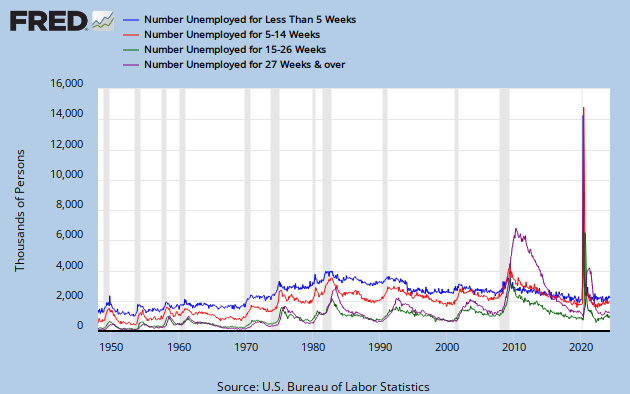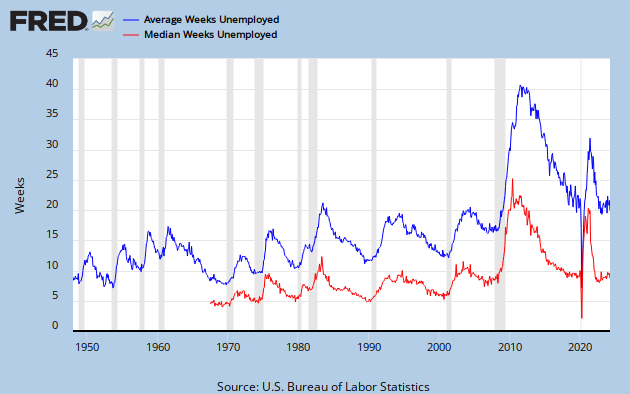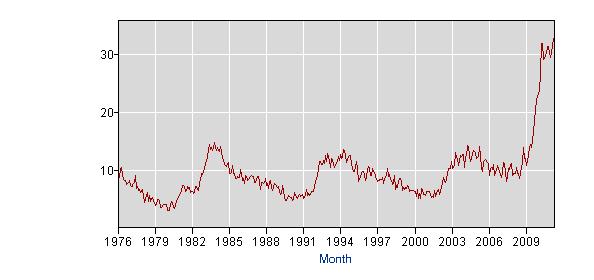Long-term Unemployment of a Year or More
On June 3rd, an article titled "Nearly 1 in 3 Unemployed Out of Work More Than a Year" was posted on the WSJ (Wall Street Journal) Blogs. Following is the second paragraph:
Even as some people are re-entering the work force, some of the extremely long-term unemployed may be giving up. The number of people unemployed for more than a year dropped a bit last month to 4.006 million from 4.076 million. They now represent 32.6% of the unemployed.
I found this especially interesting as I've never seen data for the number of people unemployed for more than a year. The following graph shows unemployment divided up into the four durations commonly released by the BLS (Bureau of Labor Statistics):

Links to the actual data used to create this graph can be found at this link and on the BLS web site. As can be seen, the longest duration is for workers unemployed for 27 weeks (about a half year) or more. And, although the number of such workers reached record levels in early 2010, the number appears to have dropped recently. In fact, the data shows that the number of workers unemployed for 27 weeks or more reached a record of 6.71 million in May of 2010 and has since dropped to 6.2 million. However, this drop seems somewhat at odds which the following graph which shows the average and median duration of unemployment since 1948:

As before, links to the actual data used to create this graph can be found at this link and on the BLS web site. As can be seen, the median duration of unemployment appears to have dropped since early 2010 but the average duration of unemployment has kept on rising. In fact, the data shows that the average duration of unemployment has reached a record level of 39.7 weeks. How can this measure continue to rise while the others have begun to drop? The most reasonable explanation would be that the number of the very long-term unemployed has continued to rise, pushing the average duration higher.
As I mentioned, I've never seen data for the number of people unemployed for more than a year. The article referenced at the start of this post does not give the source for those numbers. A bit of googling turned up this page on the BLS web site which contains a chart (Chart 2) showing the percent of workers unemployed for a year or more, followed by a link to the numbers through June of 2010. A further search of the BLS web site turned up updated numbers for Series LNU03026300, showing the percent of the unemployed who have been out of work for more than a year. The following graph was obtained on that page by changing the time span to the maximum available:
Percent of the Total Unemployed who have been Unemployed for 52 Weeks or More

As can be seen, the percent of the unemployed who have been out of work for a year or more is more than double its prior high since 1976. In fact, the data shows that it reached a record level of 32.6 percent in May, more than double the prior record of 14.8 percent reached in October of 1983.
The above graphs show that, while unemployment continues to be a problem, very long-term (more than a year) unemployment is an especially serious problem. This would suggest that long-term unemployment may require special attention in the effort to put the unemployed back to work.
Note: At the time of this posting, all of the graphs show data through May of 2011. However, the first two graphs graphs are dynamically retrieved from the Federal Reserve web site and their end dates should continue to increase. The last graph, however, is static and its end date will remain May of 2011.
Even as some people are re-entering the work force, some of the extremely long-term unemployed may be giving up. The number of people unemployed for more than a year dropped a bit last month to 4.006 million from 4.076 million. They now represent 32.6% of the unemployed.
I found this especially interesting as I've never seen data for the number of people unemployed for more than a year. The following graph shows unemployment divided up into the four durations commonly released by the BLS (Bureau of Labor Statistics):

Links to the actual data used to create this graph can be found at this link and on the BLS web site. As can be seen, the longest duration is for workers unemployed for 27 weeks (about a half year) or more. And, although the number of such workers reached record levels in early 2010, the number appears to have dropped recently. In fact, the data shows that the number of workers unemployed for 27 weeks or more reached a record of 6.71 million in May of 2010 and has since dropped to 6.2 million. However, this drop seems somewhat at odds which the following graph which shows the average and median duration of unemployment since 1948:

As before, links to the actual data used to create this graph can be found at this link and on the BLS web site. As can be seen, the median duration of unemployment appears to have dropped since early 2010 but the average duration of unemployment has kept on rising. In fact, the data shows that the average duration of unemployment has reached a record level of 39.7 weeks. How can this measure continue to rise while the others have begun to drop? The most reasonable explanation would be that the number of the very long-term unemployed has continued to rise, pushing the average duration higher.
As I mentioned, I've never seen data for the number of people unemployed for more than a year. The article referenced at the start of this post does not give the source for those numbers. A bit of googling turned up this page on the BLS web site which contains a chart (Chart 2) showing the percent of workers unemployed for a year or more, followed by a link to the numbers through June of 2010. A further search of the BLS web site turned up updated numbers for Series LNU03026300, showing the percent of the unemployed who have been out of work for more than a year. The following graph was obtained on that page by changing the time span to the maximum available:
Percent of the Total Unemployed who have been Unemployed for 52 Weeks or More

As can be seen, the percent of the unemployed who have been out of work for a year or more is more than double its prior high since 1976. In fact, the data shows that it reached a record level of 32.6 percent in May, more than double the prior record of 14.8 percent reached in October of 1983.
The above graphs show that, while unemployment continues to be a problem, very long-term (more than a year) unemployment is an especially serious problem. This would suggest that long-term unemployment may require special attention in the effort to put the unemployed back to work.
Note: At the time of this posting, all of the graphs show data through May of 2011. However, the first two graphs graphs are dynamically retrieved from the Federal Reserve web site and their end dates should continue to increase. The last graph, however, is static and its end date will remain May of 2011.
I'm the Managing Editor for logarchism.com, a political/economic blog. Could you contact me at logarchism at hotmail dot com? I'd like to ask you a couple of things.
ReplyDelete